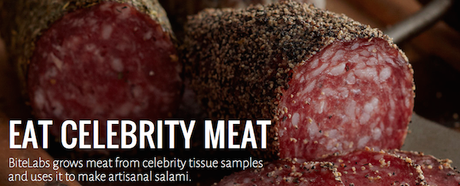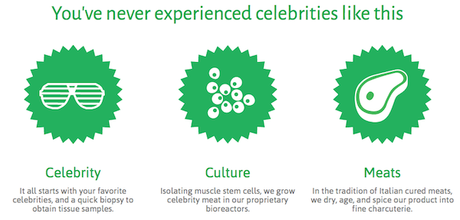CAN YOU IMAGINE SOMETHING LIKE THAT?

BiteLabs grows meat from celebrity tissue samples and uses it to make artisanal salami.

BiteLabs produces fine artisanal salami from meat that has been lab-grown from celebrity tissue samples.
In 1931, Winston Churchill predicted a future in which all the world’s meat would be grown in labs; what, he asked, was the sense in raising a whole chicken merely for the sake of its wings or breast meat?
Today, In-Vitro meat production is close to becoming a reality, offering highly controllable meat production without the animal cruelty, waste, and environmental impacts of industrial farming. But this process can offer so much more than replicas of beef and pork.
- The process begins with myosatellite cells, which are obtained via biopsy. These are a particular type of stem cell found in adult muscle that function to repair and regrow damaged muscle. Isolating a sample of these cells provides a base that can grow into as much meat as required.
- In order to produce meat in volume, we allow the myosatellite cells to multiply in a growth medium. The medium functions as a sort of artificial ‘blood,’ providing the cells with nutrients and growth factors. The stem cells must not only multiply, but also develop into actual muscle — but this occurs as a matter of course, being the primary purpose of the stem cells in the first place.
- To become meat not only in cell type but in texture and structure as well, the fledgling muscle cells are attached over a sugar support. This not only provides a structure for muscle to grow over, but also creates channels for growth medium to flow through, much like veins. At this point the growth process has moved into the bioreactors, where directional stimulation of the muscles makes them mature and become stronger.
- When fully grown, these muscle pieces are combined and ground to the desired consistency. It is at this point that we mix different types of meats, according to the specific recipes for each of our products. Spices, fats, and oils are mixed in to flavor and adjust the consistency of the meat blends.
- The ground meat is now stuffed into casings and given a final seasoning. We then dry, age, and cure our salamis in a traditional low temperature environment before packaging them for distribution.

